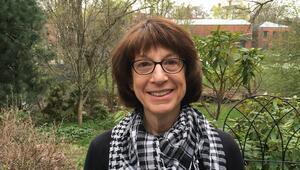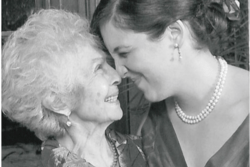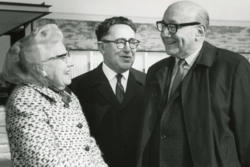Acting Our Age with Susan Goodman
Headshot of Susan Goodman, who interviews women age 85+, for the blog Acting Our Age.
Susan Goodman has spent her life ensuring that older people don’t get left out of our national narrative. She has worked for more equitable, affordable, and inclusive senior housing, organized support and care networks, and strived to make sure that seniors are not separated from the rest of society. While her life’s work is a testament to her commitment to helping people grow older with dignity, respect, and independence, Susan’s latest project is remarkable in both its scope and specificity. Currently, in order to be interviewed on Susan’s blog Acting Our Age, you must be a woman 85 or older. The blog houses 30+ such interviews.
I was fortunate enough to speak with Susan about these amazing women, what they continue to teach us, and the importance of intergenerational conversation.
Why does Acting Our Age specifically showcase older women? Why is it important to lift up these voices?
In a myriad of ways, life for women in the United States has altered dramatically in the past 80, 90, 100 years. I find it fascinating to sit down and talk with those who have personally experienced – and many times, contributed to – this remarkable scope of change.
To date, I have interviewed 30 women whose ages range from 85 to 105. The oldest women were born before the passage of the 19th amendment granted American women the right to vote. It is exciting to think that while I am interviewing women who were among the first in their families to vote, I may also meet someone whose granddaughter or great-granddaughter will be the first woman to reside in the White House as Commander in Chief.
Many of us bemoan how long it has taken for women to advance and how much further we still have to go. But, older women may experience that pace of change differently. Many, who recall waiting for coal deliveries to be hauled into their cellars, are today connecting with grandchildren on Facetime. I spoke with women, whose parents told them that it was a waste to educate girls, watch their granddaughters earn medical degrees.
Older women today offer access to a treasure trove of personal accounts from one of the most interesting times in American history. And, their stories inform much more than just the past. They have insights and perspectives about living and aging that can offer us important information for our own journeys.
What stereotypes influence how older people are perceived and treated?
One interviewee, Rose, had this insight: “Don’t put us all into one category. The only thing common about people who are aging is that every one of us is different.”
Our youth-loving society often operates with a very narrow concept of what it means to be aged. Like any marginalized group, stereotypes about older people are easy to perpetuate. These stereotypes are dismissive, shortsighted, and unfounded. It is not uncommon to hear that older people are stagnant, frail, depressed, and depressing. They are categorized as being incapable of, or uninterested in, contributing to society.
Luckily, people’s mindsets are shifting as our society ages and we engage in conversations that examine these myths. With Acting Our Age, I aim to share the voices of those whose lifestyles and perspectives challenge these misperceptions on a daily basis.
Many of the women I interview have a endless desire to learn, engage, and contribute. June, at age 89, continually researched the latest books, movies and theater so that her monthly column in the local newspaper would interest arts lovers of all ages. Rose had a bench press next to her bed and, at 91, she was up to 45 pounds. Bea was more typical. She rode a stationary bike consistently each day and was not interested in setting any record paces (although she was 105!)
My blog is filled with other impressive examples of older people living full and active lives. Before Enid and I met one afternoon, this 90-year-old dynamo had already walked two miles in the snow, responded to business emails (she was on several nonprofit boards), and participated in a film discussion at the local cinema. Then the two of us had a three-hour conversation. Afterwards, I went home for a nap and she was off to the theater!
Just as I make a conscious effort to challenge the misperceptions that older women are set in their ways and uninterested in the world, I am also mindful that it would be misleading to idealize them or champion them as “Super Seniors.” During my interviews, I found their stories to be extraordinary. These are truly ordinary women who could be our peers, our aunts, or our grandmothers. They discuss their accomplishments, but they also speak about the rough patches that are inevitable parts of life. Some have endured bad marriages, while others have experienced the nightmare of burying children. I am constantly moved by the vibrant women who speak openly about the days when they have to fight the urge to give in to their tired and achy bodies, and stay in bed.
Why is intergenerational dialogue so important?
We live in a time when “otherness” is a heightened issue. Age is one of the categories that separates us. This separation is then perpetuated by the limited variety of housing options available to older people. Whether it’s low-income, subsidized senior housing or high-end senior communities, many live in age-restricted settings. Like all segregation, it makes everyday encounters––the ones that remind us that people are people––rare and often artificial. I’m hopeful that the Baby Boomers will create more inclusive housing options.
What common themes emerge from your interviews with these women?
As I asked the women for advice on aging, several themes were repeatedly mentioned. Good genes and no debilitating conditions aside, these women mentioned the importance of a positive attitude; the willingness to push oneself in order to continue lifelong activities or explore new ones; the value of on-going relationships with younger people; and the value of exercise. Considering how often we laughed during these conversations, I must add that maintaining a sense of humor appears to be a tremendous asset!
Has there been one interview that stood out to you as particularly inspiring?
Tough question! I am happy to say that many interviews immediately come to mind.
My interview with Lillian was particularly thought provoking. Her life had been filled with impressive accomplishments. She attended college in her 40s and graduated as valedictorian from her Boston University class. At the high school where she taught, she was the first female history teacher and later, became the first female department chair. She spent rewarding years inspiring kids to learn about the past while becoming engaged in issues of social justice.
Amazingly, she remained in the job until she was 85. When I met Lillian, she had been retired for 10 years and was emphatic that seniors needed a raison d’etre. She still felt an urgent need to contribute to society, yet there are few available channels. (As an educator, she described this more aptly by saying it felt like perpetually “Waiting for Godot”).
While I was delighted to later learn that Lillian had found a niche leading multiple book clubs in her building, I continued to think about her quest. Lillian was essentially asking a very female question: “do I matter?” I hadn’t considered that this uncertainty might persist, and even become more pressing and more difficult to resolve as we grow older. I find myself wondering how this will play out for me.
What role does your Jewish identity play in the mission of Acting Our Age?
So much of my Jewish identity is focused on connection and community. A prominent goal for the blog is to make connections among generations and enlarge our notion of community. While I continue to strive to interview women of all backgrounds, to date, many I’ve interviewed are Jewish. I enjoy knowing that when I enter the home of a Jewish woman––someone who is a complete stranger––I can anticipate that some elements of her story will resonate with me. At some point in our conversation, there will likely be reference to Shabbat dinner or a Seder, and a Yiddish expression will be used. Our shared experience as Jewish women closes the gap that age and different life experiences can sometime generate.
Know a woman 85+ with an interesting story to share? Susan can be reached at susanactingourage@gmail.com.








Great interview! Thanks for sharing!